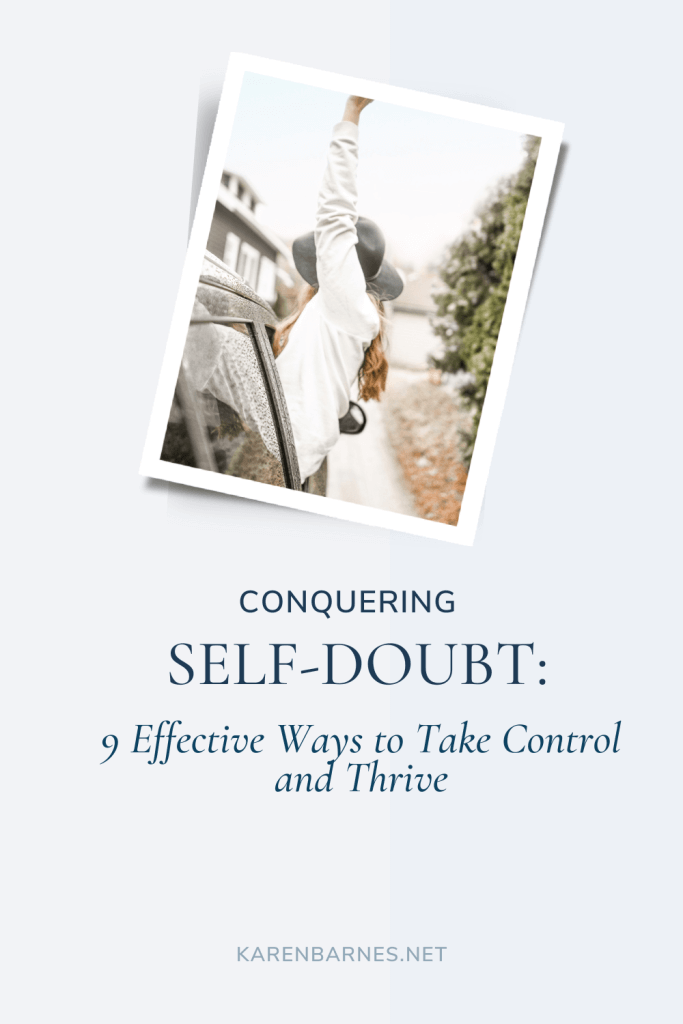
Conquering Self-Doubt: 9 Ways To Take Control and Thrive

Self-doubt can strike the most competent people, so if you get pangs of gut-wrenching doubt when you are about to do something meaningful, new or challenging, know that you are not alone.
Want to know more? Continue reading to get a better understanding of self-doubt, how we common respond to self doubt and what to do to put it back into perspective so you can move on with your life.
What is self-doubt?
Self-doubt is a pattern of thinking in which you question your own worth or competence.
You might recognise self-doubt as the feeling that causes you to second guess yourself, stopping you from taking action or moving forward towards achieving your desired goals.
How we respond to Self-Doubt
Procrastination.
We tend to put off what we fear the most. Procrastination can be a defence strategy that enables us to shift the blame from our own inadequacies to something else, such as not meeting the deadline, or studying adequately for the exam.
Imposter Syndrome – We feel like we shouldn’t be where we are because we attribute our success to outside forces, such as luck, connections or being in the right place at the right time. Hence we tend to play way below our true potential.
Self-doubt is learnt and by changing how you think and relate to yourself can help create better thoughts that ultimately make you feel better about yourself.
Ways to Conquer Self-Doubt
Here are 9 ways to help you get a different perspective and conquer self-doubt.
1. Get clear about your doubts by keeping a journal.
Journaling can be a helpful way to get clear on what it is that is driving the doubt. Here you can see if it is realistic and relevant or if you need to update your thinking and beliefs.
You might find memories or old reoccurring beliefs emerging.
Often emotions attached to those memories can keep you stuck in fear of moving forward.
Distinguishing between the past and the present is essential here. Recalling childhood memories of the class laughing when you asked a question might have you fearing a similar fate in the boardroom, but you have changed, and so has the environment. Challenge these old beliefs by finding evidence to the contrary.
2. Speak About Your Fears relating to your self-doubt
Often I find when we are fearful about something; our thoughts can play on loops in our mind. With each repeated loop, our anxiety increases.
However, speaking them out loud to someone you trust or even yourself can help you hear any distortions, exaggerations or contradictions.
From here, you can identify legitimate concerns and create new and rational thoughts about your situation.

3. Avoid unfair comparisons.
Avoid making unfair comparisons, which only leave you feeling worse about yourself.
Keep your eyes on yourself and compare your results to when you started. And have weekly check-ins to acknowledge your ongoing progress, such as last week, I didn’t know how to create a project template, but today I have completed two.
When you compare yourself to yourself, there are no unrealistic comparisons, only achievements.
Recognising my Accomplishments Worksheet
Recognising my Accomplishments Worksheet
4. Be attentive and record positive comments and feedback.
You might be highly attentive to what is not going right and to that which makes you feel inadequate.
However, train yourself to be alert to the good comments and feedback you receive. Record them in a journal and remind yourself of them often. Remember, you have been acknowledging and thinking negatively about yourself for years, so this needs to become a new habit.
Enrol the services of a trusted friend that you can call when you need some extra support or when you could do with some encouragement. Let them help you celebrate the wins and achievements throughout the week, however small they may be.
5. Distinguishing between judgement and feedback
Most people love to give you their opinions, whether they are qualified to or not. But that doesn’t mean you must listen to everything you hear, either.
Distinguish between someone’s opinion and constructive feedback. If it is someone’s opinion, understand that it is their personal view and not necessarily based on fact. If it’s feedback, take the information to improve and move on.
6. Redefining your understanding of failing
Here is the thing to remember about failure
Failing at something is not necessarily the end.
Failing at something tangible, such as a piece of work, project, or relationship, does not mean you are a failure.
It means that you may have something to learn.
Don’t allow failure to erode your confidence; but put it back into perspective. You could ask yourself – What do you need to learn or what could you do differently? What changes do you need to make? Then move forward once again.
7. Build yourself up.
Thoughts of doubt will be with you until you replace them with thoughts of self-belief. So acknowledge your strengths and abilities, write down your achievements and look at them daily.
Have a good understanding of your values and what is important to you. When a negative thought comes up, filling you with self-doubt, challenge it.
Look for the evidence to contradict it. Remind yourself of the times when you did handle the situation with confidence.
8. Examine Those Thoughts contributing to your self-doubt.
At times our inner critic can be our worst nightmare. You might recognise it as that voice in your head that tells you not to try because you will not achieve it, and everyone will think you are a loser.
The inner critic’s job is to keep us safe within the boundary of our comfort zone. Moving outside of your zone is not necessarily dangerous but uncharted and unpredictable, and the human mind prefers familiarity.
If your inner critic is loud, you might want to get quiet, take a couple of deep breaths and ask yourself – “what are you trying to keep me safe from?”
Maybe it’s from looking foolish in front of others.
Think back to a time when you spoke out in front of others, and nothing terrible happened. Reassure that part of you that is feeling scared right now. You could say, “Thanks, but I have this covered.”
9. Be kind to yourself
If there is a small part of you reliving an old fear, be gentle with yourself and speak words of kindness and compassion. You will get more leverage with kind words than beating yourself up.
If this is foreign to you and you don’t know where to start, imagine what you would say to your friend experiencing this feeling of doubt.
Think about what you want to achieve or do and work backwards, what actions do you need to take to get to where you want to be. Then one small step at a time and encourage yourself along the way

Add A Comment